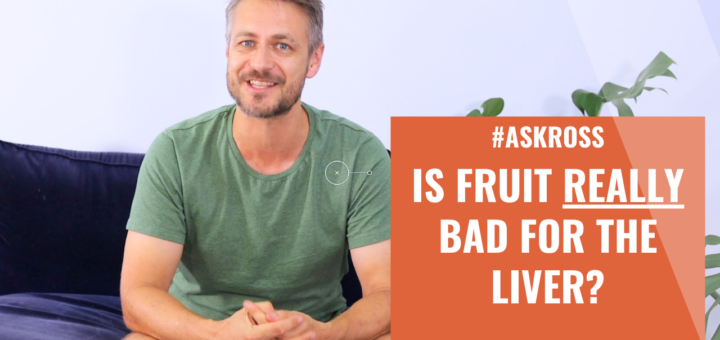Q&A: Is Fruit REALLY Terrible for the Liver? And Do I Need To Avoid It on the Alkaline Diet?
#askross: Should I Be Avoiding Fruit & Fructose?
My new book The Alkaline Life is coming soon.
Pre-order your copy here
Resources:
Complete Guide to Sugars, Sweeteners, and Healthy Alternatives
Transcript:
FAQ: Question on Fruit…
Hello! I am reading Ross’s book, The Alkaline Reset Cleanse. I’m really perplexed on the fruit sugars. Everything makes sense but I know so many people who thrive on high fruit diets (even a diabetes program, mastering diabetes). I’ve always understood it that fruit (or glucose) and fat do not go together, you’ve pretty much got to choose your energy source. But it’s hard for me to believe that fruit is horrible for the liver when I see so many people doing well with it. I’ll keep reading but any further explanations would be great!
Let’s talk about fruit
Issue isn’t with fruit itself, fruits are full of goodness. I’ll get into all of this and the nuance here that’s important in just a moment.
First let’s dig into the concept of glucose/fructose and fat. You’ve said “fruit (or glucose) and fat do not go together, you’ve pretty much got to choose your energy source”.
This is a really important one to dig into.
So first delineating between fructose and glucose. Fruit, which is the focus of the question here, contains primarily fructose, and some glucose. But fructose and glucose operate differently in the body, and I want to cover this off before we jump into the relationship between those and fat, and the source of energy.
Both fructose and glucose are monosaccharides, meaning they are a simple sugar, the simplest of sugars, and cannot be broken down into super sugars. They share the same chemical formula (C6H12O6), but their atoms are arranged differently and this is why they are metabolized differently in the body.
Glucose is absorbed directly into the bloodstream through the intestinal lining. It raises blood sugar levels, which in turn stimulates the release of insulin from the pancreas. Insulin helps glucose enter the body’s cells, where it’s used for energy. Under normal conditions, the body prefers glucose for energy because it’s easily accessible and can be quickly metabolized.
Fructose can only be metabolised by the liver, and it is quite a stressful process. With small amounts there is not an issue, but when there is a lot all at once (such as with fruit juices, dried fruit, or syrups, HFCS etc) OR a reasonably high amount long-term (lots of processed foods using sweeteners and HFCS etc) it causes a ton of inflammation and fat cell formation, uric acid production and more. Both situations cause problems – concentrated fructose, and long-term high levels of fructose. This is important for in just a minute – hold onto that for a sec.
They are different, the body uses them differently, and fructose is not the body’s primary source of ‘sugar’ energy. In the liver, fructose can be converted into glucose, or glycogen (the stored form of glucose in the liver). It doesnt raise blood sugar levels, and doesn’t require an insulin response. It can be used directly for energy WITHIN the liver cells, but thats about it.
Glucose is by FAR the body’s primary source of energy when it comes to sugars. The rise in blood sugar triggers the release of insulin, which helps cells absorb glucose and use it for energy. Fructose doesn’t have this release of insulin or conversion.
OK, so we’re clear on that: so moving onto the next part of the question – do you have to pick EITHER glucose OR fat as a source of energy. I feel like if I did a little dig around into the source of this question it might be coming from the very low fat high fruit vegan crowd, and it is complete nonsense. I feel like someone is just making this stuff up to get you fully converted to their FATS ARE BAD thing. Don’t get sucked in, it is total rubbish.
So focusing on glucose vs fat as the discussion now, we’ll park fructose for a minute before we come back to the ‘I know so many people who thrive on high fruit diets’ question…
SO glucose, as we’ve said is the body’s primary energy source. Under normal conditions the body uses glucose first for energy because it’s easily accessible and can be quickly metabolized. Carbohydrates in the diet are broken down into glucose, which is then used by cells for energy.
FAT on the other hand is used by the body for energy by breaking down stored fats into fatty acids and glycerol, which are then converted into energy. The liver of course can also convert these fatty acids into ketones, but we wont go down the rabbit hole of keto on this video.
The body can use both and…this is important…the body can SWITCH BETWEEN GLUCOSE AND FAT AS NEEDED and based on what’s available. It is called METABOLIC FLEXIBILITY. We all do it every night while we’re asleep. After the glucose from the days food diminishes our body will gradually shift to burning more fat – the body preferences fat as an energy source while we sleep.
We are not consciously choosing this.
SO in a state of very very low carb consumption, like when in nutritional ketosis, the body will happily shift to fat as a fuel. No problems there. And people who are TRYING to be in nutritional ketosis, which is actually quite hard, will often dance along that line for days of flipping back and forth between fat and glucose for energy throughout the day. There is no noticeable health consequence to this.
So if you are CHOOSING fat as your energy source, you will keep flipping back and forth unless you’re super strict and adhering to keto principles, and this is fine (it just won’t get you the keto benefit you’re after).
And if you are CHOOSING glucose (or fruit and sugar) as your energy source your body will STILL FLIP to FAT burning at night, when you’re asleep or if you get low on glucose at any time, it just jumps into your fat stores for energy.
To put it simply, you definitely do not have to choose. There is no negative consequence to using both, and all of us are all day every day (unless you’re strict keto). Metabolic flexibility is a critical aspect of human metabolism.
OK, so let’s get into the last two bits of the question. I talk about this a lot in my new book The Alkaline Life, which you can pre order on the link below by the way – little plug there. So lets get into this important question of IS FRUIT BAD FOR YOUR LIVER….
So… Firstly, is fruit HORRIBLE for the liver? No.
Is too much fructose horrible for the liver? Definitely YES.
Fruit in moderation is totally fine and awesome. Especially if you focus on the lower-sugar fruits like berries, that are also really high in awesome antioxidants. Blueberries are my favourite by the way. But ANY fruit is fine in moderation. 1-2 serves a day, sometimes 3, whatever, it’s all good.
The issue comes with, as I said before: either very concentrated fructose hitting the liver all at once, or moderate to high fructose levels over the long term.
By far the biggest risk is from syrups, added sugars, things like High Fructose Corn Syrup.
However, concentrated fructose from juices, smoothies, dried fruits is a risk. This is why we don’t have fruit in our green juices. It is just really an unnecessary stress to the liver, source of acid and inflammation. And I don’t include dried fruits except for the occasional cranberries in a salad here or there, I think one of my 500+ recipes might have it.
Juices are an issue especially because of a few reasons: 1) We remove the fibre, and fibre slows the metabolism. So eating whole fruit is fine, juicing is not so good. 2) we tend to include a lot of fruit. You see some ‘green juice’ recipes that are like 2 apples, 1/2 pineapple, 2 oranges, a pear and 2 leaves of spinach. That is not a green juice. And would also contain about 40g sugar. All hitting the liver within minutes. This would be very inflammatory and stressful and cause a ton or uric acid to be produced.
So this is where I stand with fruits. You don’t have to eliminate or avoid. Lower sugar fruits are awesome to have and any other fruit is fine in moderation. Don’t even think about it if you’re eating whole. ITs all fine. You can relax over this.
Juices, dried, blended etc is a bigger concern. And the BIGGEST issue is of course syrups, sweeteners, added sugars, HFCS and so on.
I will link to my guide to sugars below this video for you to check out.
And the final question: “I know so many people who thrive on high fruit diets”
I get this a bit with all sorts of different diets: “my friend is going great on a carnivore diet”, “my cousin is losing weight on a raw diet”…
It makes total sense. Raw, keto, paleo, fruit-only, carnivore.,.,. all of these are WAY WAY WAY better for you than a standard modern diet…eeeehhhrhrrr OK maybe not carnivore…but of course, these are all SO much better and will deliver HUGE benefits if you’re switching from a regular modern diet to a higher fruit diet, or a keto diet…and they do all have merit.
However, this doesn’t mean it is optimal, or even close to optimal, or should be taken on by others. Eating only fruit is not a great choice. Better than eating a standard modern diet, but nowhere near as good as it could or should be. We could analyse this for house, but even just omitting healthy fat is a terrible choice. These fats are so critically essential, and can all be gained from plant sources so there can’t be the vegan agenda here. Not including leafy greens makes no sense either. These are the most micronutrient dense of all foods. Hands down. And they contain antioxidants that are unique to them.
A diet of leafy greens, healthy fats, nuts, seeds, vegetables AND fruit, is ALWAYS going to be far far far far more productive than a diet of fruit only.
It is not to say someone eating only fruit and NO processed foods like HFCS are going to have an terrible liver. I’d definitely be interested to see their Liver Function Test results, but it is better than eating tons of processed food of course. High fructose in the case of your friend wouldn’t be an issue per se with diabetes because fructose doesnt spike insulin, so thats not a part of the puzzle.
But excluding other foods types to consume just fruit isn’t a smart choice. It will be missing nutrients, fat in particular, which are just so essential. And if there is lot of fruit being juiced, smoothies, dried fruit and lots of fructose in general from eating only fruit all day every day, there is not doubt that the inflammatory response, and uric acid production among other things will have a long term impact.
My recommendation would be to you, especially as The Alkaline Reset Cleanse is all making sense is – GO FORTH with living alkaline, include fruit, smile and nod when your friend talks about all their fruity meals, and enjoy your food. Don’t restrict yourself too much, dont try to be perfect, and definitely take everything one step at a time. I feel like I’ve answered questions you asked, and a couple you didnt but thats all good, right!
OK, I hope this has helped! And don’t forget to pre order my new book The Alkaline Life on the link below too!





